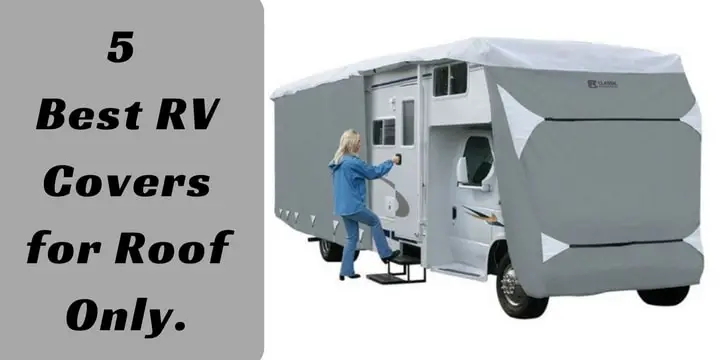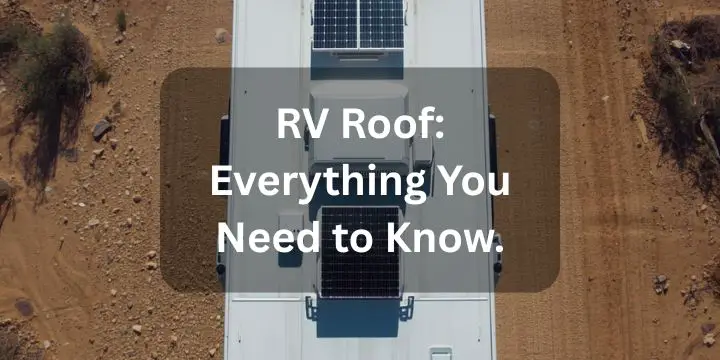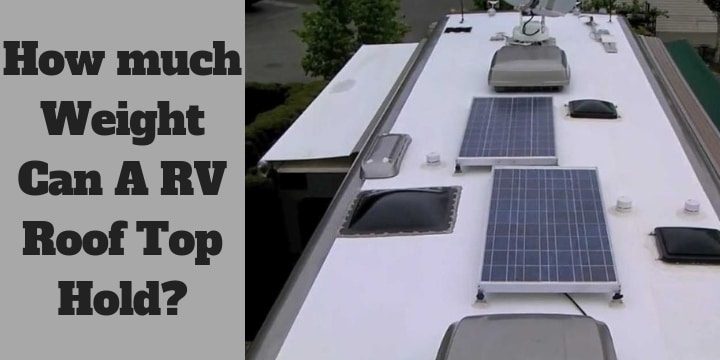5 Best RV covers for the roof only.
When you buy an RV, the feeling is like you’ve added a new house to your family. You want to use it, have fun in it, spend time in it and try to make it your second home. If you want all of the things we’ve described to last, one of the main things you have to do is to take care of your RV.
And the essential part of taking care of your RV is preventing natural phenomena like rain or snow or wind to cause any kind of damage. In order to manage that, one of the most useful purchases for your RV’s protection is cover.
What does RV cover for the roof only do?
During winter, it stops snow or ice from getting through to the roof and damaging it. When it rains outside, RV cover will keep your vehicle dry, or at least dryer than it would be without it. When it’s windy outside, it protects from tree parts, branches, leaves, or dust, and in the summer it keeps the sun out, so your paint would not suffer.
We’ve selected three different types of covers and you can read about them in the rest of the post.
ADCO Roof Only Cover – White Tyvek
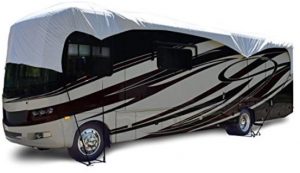
If you are looking for a cover that will protect only your roof and nothing else, ADCO is if not the best, then the only choice you have. This product is constructed using Dupont Tyvek, which should provide UV resistance and maximum duration. Because it is water-resistant, it will keep your roof safe from rain or snow and prevent it from being damaged. Also, it is said that it shouldn’t interfere with anything mounted on the roof, like horns, AC, satellite antenna…
The size of it varies, so you should measure your RV’s roof size to find the one that will fit perfectly.
Alternatives RV covers
Considering the fact that ADCO is the only one who produces roof-only covers, if you want specifically those, you’d have to go to them. But, there are few alternatives.
Classic Accessories OverDrivePolyPRO 3 Deluxe Class B RV Cover
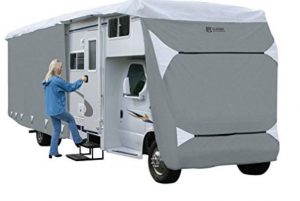
This product is not a roof-only cover, but it doesn’t cover the whole RV.
It weighs around 15 pounds, it also comes in different sizes and should fit without any problem. This triple-ply PolyPro 3 cover is thick, but it should easily prevent rain or snow from coming through to your vehicle.
It also has single-ply sides protection against snow, dirt, scratches, and it also helps during hot summer to keep it cool. It has zippered panels, so you could access your RV’s doors and engine. It comes with stuff sacks and has a 3-year warranty.
EmpireCovers Premier Class B RV Cover
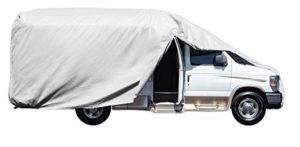
Another alternative is this cover made by EmpireCovers. It is not a „roof-only“ cover, but it comes with zippers who allow total access. It is made from 300 denier polyester, and, as it is pointed out on Amazon, should be completely waterproof. It also has a Durable Water Repellent coating, so it should keep all of the possible moisture outside. But, its triple-layered SFS top will allow your RV to breathe.
CAMCO UltraShield Class A Cover
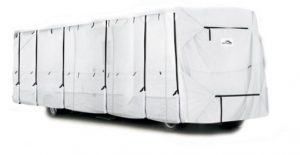
CAMCO UltraShield Class A Cover Pros:
- It is made from is made of polyester and it is considerable for hot climates
- Has vent flaps that decrease billowing
- Integrated with heavy-duty zippers for easy access to storage and doors while easily securing in place.
CAMCO UltraShield Class A Cover Cons:
- Some people have complained about the design especially in the mounting process
Leader Accessories Travel Trailer Rv Cover
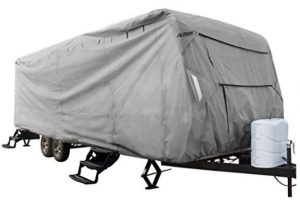
Leader Accessories Travel Trailer Rv Cover Pros:
- Tough water repellent material inhibits mildew and mold
- Adjustable rear and front tension panels
- Zippered panels enable access
Leader Accessories Travel Trailer Rv Cover Cons:
- You cannot utilize the roof vents as a means of reducing humidity.
Expedition RV Trailer Cover
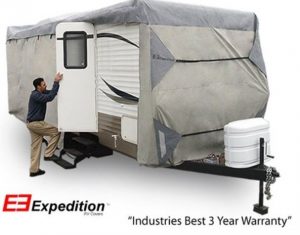
Expedition RV Trailer Cover Pros:
- They have an Ultraviolet finish to aid to reduce UV damage
- These covers contain propylene and include a zippered entry side
- They have zippered panels that allow easy access
- They come with a 3-year warranty.
Expedition RV Trailer Cover Cons:
The material is not so good, it can be very easy irresistible damaged.
The Bottom Line
The cover should be made from materials that can last longer. Therefore, note that quality is not cheap.
Related Post: 45 RV Accessory Must-Haves for Your Travel Trailer
Related Questions:
Care for your RV in the best ways to keep it in good condition. Consider covers and whether or not they are best. Read all the information below and then decide if you need to invest in one.
RV Cover Or Roof Cover Only – Pros And Cons?
The type of RV cover you need depends on the type of RV you have and where you are storing it. If you want to keep it protected in the winter, then an RV cover can be a good idea. One of the pros to it is that it will keep all the elements out of it. But if you aren’t storing the RV for too long, then you might want to get a roof cover only. This is much easier to put on, while one of the cons is that it doesn’t protect it as well. A con to a full cover is that it can be dangerous to try to get it over the RV.
Is It Better To Cover Your Camper Or Not?
It is a good idea to cover the camper. A cover keeps it from getting water damage or any other type of damage from falling branches or anything like that. It is good to cover it when not in use.
Video overview: SHOULD YOU USE AN RV COVER?
Is It Good To Cover Your RV In The Winter?
Yes, you will want to cover it in the winter. Any kind of water getting into the RV is not good, but snow can quickly pile up on it in the winter. Ice can cause damage, too, and you need a cover in place to keep damage from occurring.
Do RV Covers Cause Damage?
A poorly made RV cover can cause damage. You need to be careful about which one you pick. Make sure that it fits the RV well and will not blow off or rub against it in the wrong way.
Does RV Insurance Cover Water Damage?
If you have RV insurance, then you might be curious to know what it covers. If you get water damage in your RV, will it be covered? Comprehensive coverage is all about damage like this, and if you have a good policy and water damage happens, then you should be covered.
Learn what needs to be done to protect the RV so that you can give it good care. Get the right cover if you need one to make sure that it will not cause more harm than good. Protect your RV when it is not in use so that you can enjoy yourself by taking it out whenever you want.
> You may also like: Least-Visited National Parks: Why They’re Worth a Look<<
